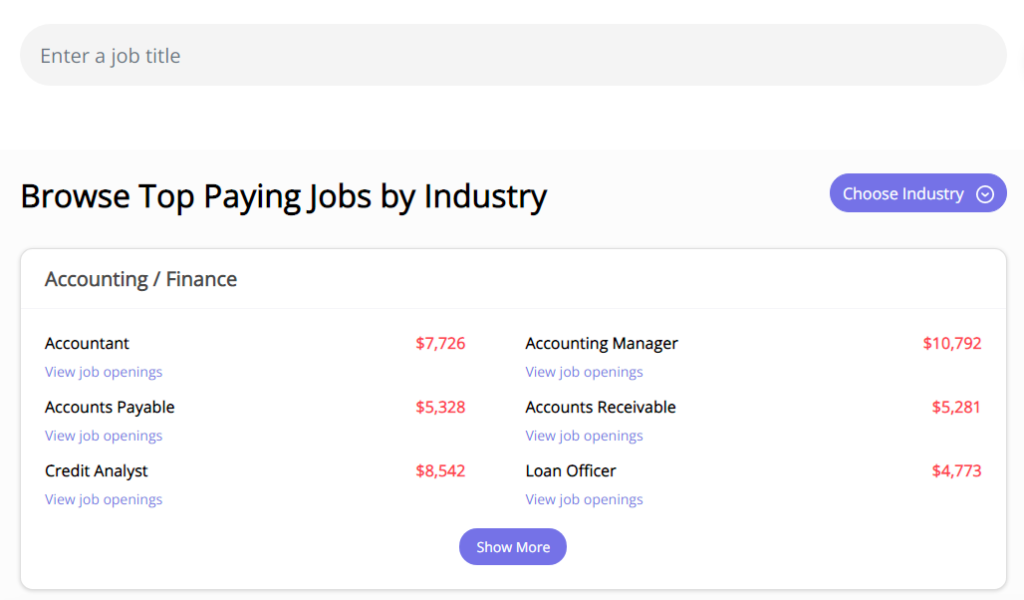In recent months, Australia’s unemployment rate has dropped to 4.6 per cent. That’s down from 4.9 per cent, where it sat in July during the major lockdown in the greater Syndey area.
Australia’s economy, fortunately, did not suffer a massive drop in jobs during this lockdown, and new jobs are being added every day.
If you’re looking for work in Australia, whether you’re a local or an ex-pat getting ready to make a big move, there are lots of options for you to consider. At the same time, though, it’s understandable that you’re curious about the average salary here. After all, who doesn’t want to know what they can expect to earn while working in the land down under?
This Australia salary guide will break everything down and help you gain a better understanding of the expected salary range for jobs in Australia.
For expats looking for jobs in Australia, locals who want to make a career switch, and everyone in between, the GrabJobs Australia Salary Guide Tool is a must-use.
This tool will help you to learn about the average salary in Australia for various jobs. That way, you can have clear expectations for your income when you begin working here.
The GrabJobs Australia salary guide tool is easy to use and guides Australian job seekers so they can find the best-paying jobs in their preferred industries. These job seekers can also use our tool to narrow down their search based on a variety of criteria, such as job type, salary range, skills, experience, and more.
The Australia Salary Guide Tool features a series of links that direct job seekers to the latest job listings, too. With this feature, they can clearly see a breakdown of each position before they apply so they can feel confident it’s a good fit.
What Skills Are in High Demand in Australia in 2024?
In Australia, as in other parts of the world, a person’s salary often depends largely on job demand and the skills and value that person can bring to the company doing the hiring.
If you take the time to develop some in-demand skills, you’ll have an easier time negotiating a higher salary and getting paid what you’re worth.
Listed below are 10 of the most high-demand skills you ought to consider working on if you want to increase your chances of getting hired in Australia.
Why Accounting and Finance Skills Are in High Demand?
No matter what products or services they sell, all businesses need the help of accountants and other financial experts.
Relevant Jobs
Where to Learn Accounting and Finance Skills?
There are lots of online courses that can help you expand your accounting and finance skills; many are available through platforms like Coursera and LinkedIn Learning.
Why Construction Management Skills Are in High Demand?
Infrastructure is a top priority in Australia right now, which means there are lots of opportunities for construction managers to head various projects throughout the country.
Relevant Jobs
Where to Learn Construction Management Skills?
Why Customer Service Skills Are in High Demand?
All kinds of businesses need help from professionals with good customer service skills to build relationships and support customers and clients.
Relevant Jobs
Where to Learn Customer Service Skills?
You can find lots of online courses that teach customer service skills on platforms like EdX and LinkedIn Learning.
Why Teaching Skills Are in High Demand?
Students of all ages need (and always will need) the guidance of skilled teachers to reach their full potential.
Relevant Jobs
Where to Learn Teaching Skills?
To work as a teacher, you will need a degree from an accredited university. However, you can sharpen your skills using free courses available through Coursera.
Why Civil Engineering Skills Are in High Demand?
Like construction managers, civil engineers are needed to support and expand Australia’s growing infrastructure.
Relevant Jobs
Where to Learn Civil Engineering Skills
Why Project Management Skills Are in High Demand?
From the tech world to the construction world, businesses across all industries can benefit from the guidance and knowledge of skilled project managers.
Relevant Jobs
Where to Learn Project Management Skills
There are lots of online courses through platforms like Udemy that can help you to sharpen your project management skills.
Why Marketing Skills Are in High Demand?
All kinds of businesses can benefit from skilled marketers who can help them expand their reach and promote their products or services to the right people.
Relevant Jobs
Where to Learn Marketing Skills?
You can learn a lot about marketing from platforms like LinkedIn Learning and EdX.
Why Sales Skills Are in High Demand?
Similar to marketers, businesses also need help from skilled sales experts to expand their reach and boost their revenue.
Relevant Jobs
Where to Learn Sales Skills?
You can build your sales skills using a variety of online programs, including those available through Coursera.
Why Logistics Management Skills Are in High Demand
Logistics management skills are in higher demand than ever because the ecommerce industry is growing rapidly and more people are ordering products online (and expect them delivered in a timely manner).
Relevant Jobs
Where to Learn Logistics Management Skills
Why Web Development Skills Are in High Demand
Both businesses and individual entrepreneurs need help from web developers to build websites and apps that allow them to expand their offerings and reach a wider audience.
Relevant Jobs
Where to Learn Web Development Skills?
You can learn web development skills through a range of online platforms, including LinkedIn Learning and Coursera.
What Are the Expected Salary Ranges for the Jobs in Australia?
The average salary in Australia is $63,085, according to the most recent tax records. What this information doesn’t tell you, though, is the average amount of money you can expect to make when you work in Australia.
The expected salary range in Australia varies based on a lot of factors, including, in part, on the type of job you choose. Listed below are 10 popular jobs in Australia, complete with salary information to help you get a better and more specific idea of what you can earn:
Expected Salary Range: $100K to $180K
Top Companies Hiring IT Systems Architects in Australia
- NSW Department of Communities and Justice
- MK InfoTech
- University of Western Australia
Career Prospects
There are lots of opportunities for systems architects who can assist with project planning, implementation, and troubleshooting.
Expected Salary Range: $60K to $170K
Top Companies Hiring Cloud Engineers in Australia
- Microsoft
- National Australia Bank
- ResMed
Career Prospects
Lots of tech companies in Australia need help from cloud engineers to expand their product and service offerings, so there are plenty of opportunities throughout the country.
Expected Salary Range: $80K to $150K
Top Companies Hiring Data Scientists in Australia
- Australian Bureau of Statistics
- Nine
- Department of Premier and Cabinet
Career Prospects
Data scientists are needed across a variety of industries, including the civil service industries, so there are lots of job openings to consider.
Expected Salary Range: $78K to $160K
Top Companies Hiring Project Managers in Australia
- Hazell Bros
- Australian Criminal Intelligence Commission
- TikTok
Career Prospects
Project managers are needed to assist companies in a variety of industries, including many tech companies, so prospects look very good.
Expected Salary Range: $65K to $100K
Top Companies Hiring Civil Engineers in Australia
- AECOM
- Diona
- City of Clarence
Career Prospects
With Australia’s growing infrastructure demands, there’s a strong demand for civil engineers throughout the country.
Expected Salary Range: $89K to $150K
Top Companies Hiring for Human Resource Managers in Australia
- The GEO Group Australia
- Rotork
- Holiday Inn
Career Prospects
Career prospects look great for human resource managers (and other human resource professionals), especially as businesses continue working to bring on more talented employees.
Expected Salary Range: $60K to $80K per year
Top Companies Hiring Early Childhood Teachers in Australia
- Northern Beaches Council
- Kuringai Municipal Council
- Macquarie University
Career Prospects
As parents return to work after lockdowns lift, there’s going to be an increased need for early childhood teachers who can care for and instruct their kids.
Expected Salary Range: 86K to 130K per year
Top Companies Hiring Accountants in Australia
- Marathon Health AU
- Glencore
- Coronis
Career Prospects
Lots of businesses and individuals in Australia need help to manage their finances and make wise investments, and that need isn’t going to go away anytime soon.
Expected Salary Range: $50K to $110K
Top Companies Hiring Warehouse Managers in Australia
- Humanology
- Total Tools
- Nick Scali Furniture
Career Prospects
As the logistics industry grows, so will the need for warehouse managers to keep everything running smoothly.
Expected Salary Range: $100K to $150K
Top Companies Hiring Full Stack Developers in Australia
- Janison
- Deswik
- Dialog Information Technology
Career Prospects
Lots of businesses throughout Australia need help from full stack developers to build and maintain their websites, apps, and other tech offerings, so career prospects look promising now and in the future.
What Is the Average Salary Across Industries in Australia in 2024?
When it comes to calculating the average salary in Australia, it’s important to take a person’s specific industry and profession into account for more accurate planning.
In the following table, you’ll see a breakdown of some of Australia’s most popular industries and professions, along with the average salary range you can expect to earn if you work in one of these fields:
Profession
Average Salary in Australia
Accountant
86K to 130K per year
Finance Manager
100K to 150K per year
Sales Manager
65K to 180K per year
Business Development Manager
60K to 150K per year
Chief Executive Officer
97K to 300K per year
Chief Finance Officer
98K to 240K per year
General Manager
70K to 200K per year
Legal Assistant
50K to 85K per year
Customer Service Manager
58K to 130K per year
Human Resource Manager
89K to 150K per year
Construction Manager
62K to 190K per year
Hospitality/Hotel Manager
60K to 180K per year
Tourism/Travel Agent
52K to 55K per year
IT Manager
86K to 210K per year
Graphic Designer
50K to 90K per year
Civil Engineer
65K to 100K per year
Electrical Engineer
64K to 120K per year
Mechanical Engineer
60K to 120K per year
Aerospace Engineer
64K to 100K per year
Architecture Engineer
56K to 120K per year
What Else Should I Know About Salaries in Australia?
Beyond the expected salary range in Australia, there’s a lot more you should know before you start looking for work here. The following are some other details to keep in mind regarding salaries and life in Australia in general:
What Is the Cost of Living in Australia?
The cost of living in Australia is quite a bit higher than it is in other western countries, including the United States.
For comparison, the average expenses for a family of four in Australia are around A$4,733.52 (or USD 3,458.90), without including rent. The average expenses for a single person are around A$1,326 (or USD 968.97), without including rent.
Although the average cost of living is higher than in the U.S., the cost of rent is quite a bit lower (10.98 per cent, to be specific).
How Much Will I Pay in Income Taxes?
Income tax rates in Australia vary based on the amount you earn per year. For Australian residents, income tax rates are as follows:
- 0 – $18,200: $0
- $18,201 – $45,000: 19 cents for each $1 earned over $18,200
- $45,001 – $120,000: $5,092 plus an additional 32.5 cents for each $1 earned over $45,000
- $120,001 – $180,000: $29,467 plus an additional 37 cents for each $1 earned over $120,000
- $180,001 and over: $51,667 plus an additional 45 cents for each $1 earned over $180,000
Residents must also pay a Medicare levy of 2 per cent of their income.
For foreign residents, income tax rates are slightly different:
- 0 – $120,000: 32.5 cents for each $1 earned
- $120,001 – $180,000: $39,000 plus an additional 37 cents for each $1 earned over $120,000
- $180,001 and over: $61,200 plus an additional 45 cents for each $1 earned over $180,000
What Kinds of Benefits Do Jobs Offer in Australia?
Mandatory employee benefits in Australia include the following:
- Retirement or “superannuation” contributions
- Paid Time Off (PTO), including holiday pay, long service leave, maternity/paternity leave, and sick pay
Many Australian employers also offer supplementary employee benefits, which include education advancements, flexible working arrangements, voluntary benefits, and health insurance.
How Should I Negotiate My Salary?
If you’re offered a job but aren’t satisfied with the salary that comes with it, there may be some room for you to negotiate and get more money. If you do plan to negotiate with your potential employer, here are some tips that can help:
- Have two numbers in mind: The number you want and the minimum number you’ll accept; don’t settle for anything less than this second number
- Explain the benefits of paying you a higher salary (e.g., more motivation to do more for the company, more motivation to stick around long-term, etc.)
- Consider negotiating benefits (in addition to or instead of your salary)
- Practice with a friend before you go into the negotiation meeting so you can feel calm, prepared, and confident
Final Thoughts on the Average Salary in Australia
Now that you’ve read through our Australia salary guide, do you feel more prepared to take the plunge and enter the Australian workforce?
With this information in mind, you can know, on average, what the average worker makes in your preferred industry. You can also feel more confident about your negotiating tactics and know that you’re asking for a fair salary.
Remember the details discussed above, and don’t forget to check out the GrabJobs search tool if you need help finding openings in your area and in your chosen field.










